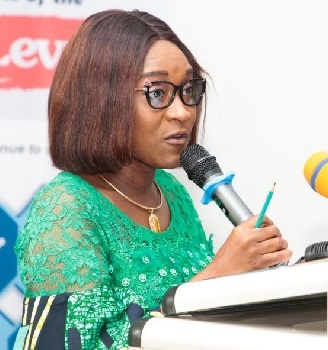Mobile Money Transactions Hit Ghs1 Trillion; Up from GHS155 bn in 2017
“Many of us do not pay income taxes and so, government is hoping that with the introduction of e-levy, it will help us widen the tax base to include a large portion of the population who are eligible to pay taxes, but are not seen.”
A Deputy Minister for Finance, Madam Abena Osei-Asare, says digital transactions have experienced a phenomenal growth over the past five years, with a steady growth in the number of registered mobile money accounts.
Quoting a Bank of Ghana report, she said the total transaction value for Mobile Money Interoperability, which is the amount of money that is transferred across the various networks, exceeded One Trillion Ghana Cedis in March 2021, up from approximately one hundred and fifty-five billion Ghana Cedis in 2017.
Speaking at a four-day sensitisation workshop for Information Services Department (ISD) staff on the E-levy in Kumasi on Monday, this week, she indicated that there are lot of businesses in the mobile transaction space, saying “this tells us that individuals and businesses from online business accept payment electronically rather than physical cash.”
She, however, regretted that “these transactions are largely untaxed and while the industry grows, several government revenue sources like the Value Added Tax (VAT), National Health Insurance (NHIS) levy, which are directly impacted, are experiencing a decline in growth.”
Madam Abena Osei-Asare, however, pointed out that though the government is hoping the newly introduced E-Levy would rope in more people into the tax net and help Ghana mobilise the needed revenue for economic development, it does not mean the new tax would solve all our economic problems.
According to the Deputy Finance Minister, it is only 20% of eligible Ghanaian tax payers who are actually paying tax to the state. “Many of us do not pay income taxes and so, government is hoping that with the introduction of e-levy, it will help us widen the tax base to include a large portion of the population who are eligible to pay taxes, but are not seen.”
Madam Abena Osei-Asare further told the ISD staff that the e-levy was meant to support revenue mobilization, tackle challenges of high unemployment and address inadequate physical and digital infrastructure such as roads, hospital, schools.
Fatimatu Abubakar , the Deputy Minister for Information on her told the ISD staff that programme was meant to empower them to embark on a public education campaign to sensitise Ghanaians about the importance of e-levy .The engagement, according to Abubakar, is part of many gatherings that have already been held across Ghana.
By FRANCIS OWUSU-ANSAH || The Chronicle


